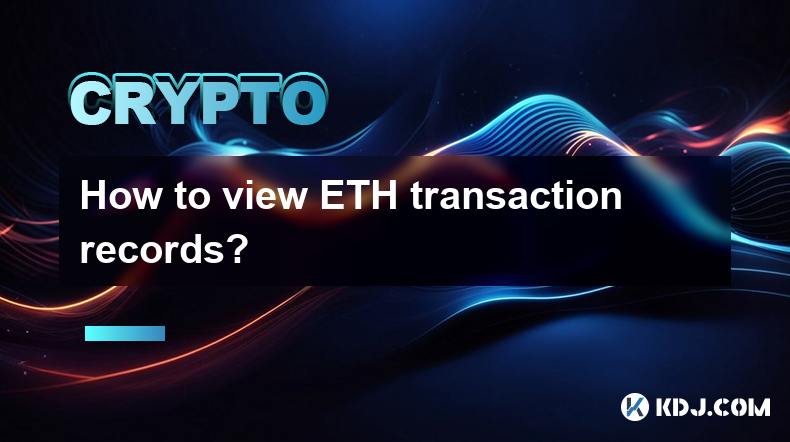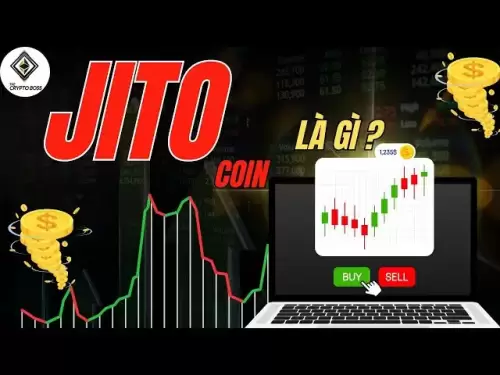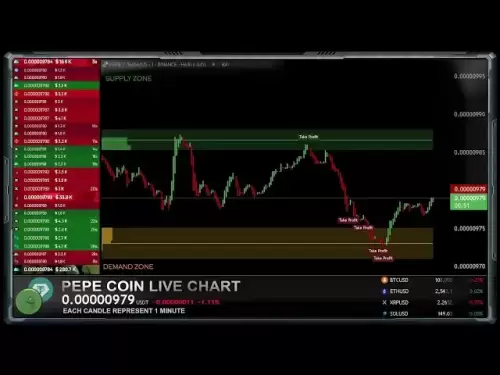-
 Bitcoin
Bitcoin $107,810.8710
-1.45% -
 Ethereum
Ethereum $2,531.4386
-1.75% -
 Tether USDt
Tether USDt $1.0000
-0.03% -
 XRP
XRP $2.2542
-0.99% -
 BNB
BNB $659.1350
-0.50% -
 Solana
Solana $148.5456
-2.40% -
 USDC
USDC $0.9999
-0.02% -
 TRON
TRON $0.2868
-0.44% -
 Dogecoin
Dogecoin $0.1666
-3.65% -
 Cardano
Cardano $0.5751
-2.36% -
 Hyperliquid
Hyperliquid $37.6845
-5.51% -
 Bitcoin Cash
Bitcoin Cash $494.9448
-0.65% -
 Sui
Sui $2.8396
-3.31% -
 Chainlink
Chainlink $13.2423
-2.59% -
 UNUS SED LEO
UNUS SED LEO $9.0482
0.02% -
 Stellar
Stellar $0.2467
-2.44% -
 Avalanche
Avalanche $17.8165
-3.63% -
 Shiba Inu
Shiba Inu $0.0...01158
-2.41% -
 Toncoin
Toncoin $2.7397
-3.42% -
 Hedera
Hedera $0.1560
-2.73% -
 Litecoin
Litecoin $85.8559
-2.34% -
 Monero
Monero $315.3710
-2.30% -
 Dai
Dai $1.0001
0.00% -
 Polkadot
Polkadot $3.3443
-2.03% -
 Ethena USDe
Ethena USDe $1.0001
0.01% -
 Bitget Token
Bitget Token $4.2888
-3.73% -
 Uniswap
Uniswap $7.3388
-1.57% -
 Aave
Aave $278.2986
-3.05% -
 Pepe
Pepe $0.0...09807
-3.67% -
 Pi
Pi $0.4563
-2.39%
How to view ETH transaction records?
To view ETH transactions, use block explorers like Etherscan, wallet history, Ethereum APIs for advanced analysis, or third-party analytics platforms like Nansen.
Apr 17, 2025 at 06:36 pm

Understanding how to view Ethereum (ETH) transaction records is essential for anyone involved in the cryptocurrency ecosystem. Whether you're a trader, investor, or simply someone interested in blockchain technology, being able to track and review your transactions is crucial for managing your assets effectively. In this article, we will explore various methods and tools that allow you to access and analyze your ETH transaction history in detail.
Using Ethereum Block Explorers
Ethereum block explorers are among the most popular tools for viewing ETH transaction records. These platforms provide a comprehensive view of the Ethereum blockchain, allowing users to search for specific transactions, addresses, and blocks.
- Visit a block explorer website: Some of the most widely used Ethereum block explorers include Etherscan, Ethplorer, and Blockscout. Choose one that suits your needs and navigate to its homepage.
- Search for a transaction: To view a specific transaction, you'll need the transaction hash. Enter this hash into the search bar on the block explorer's homepage and hit enter.
- Review transaction details: The block explorer will display detailed information about the transaction, including the sender and recipient addresses, the amount of ETH transferred, the gas used, and the transaction fee.
- Explore additional features: Many block explorers offer advanced features, such as the ability to track token transfers, view contract interactions, and analyze transaction patterns over time.
Accessing Transaction History via Wallets
Another convenient way to view your ETH transaction records is through the wallet you use to manage your cryptocurrency. Most reputable wallets provide users with easy access to their transaction history.
- Open your wallet: Launch the Ethereum wallet application on your device or log into your wallet's web interface.
- Navigate to transaction history: Look for a section labeled "Transactions," "History," or "Activity." This section will list all the transactions associated with your wallet address.
- View transaction details: Click on a specific transaction to view more details, such as the date, amount, and recipient address. Some wallets may also display the transaction hash, which you can use to look up the transaction on a block explorer.
- Export transaction data: Some wallets allow you to export your transaction history as a CSV file, which can be useful for record-keeping and tax purposes.
Using APIs for Advanced Analysis
For those who need more advanced transaction analysis capabilities, Ethereum APIs offer a powerful solution. APIs allow developers to programmatically access and manipulate blockchain data, enabling the creation of custom tools and applications.
- Choose an API provider: Several companies offer Ethereum APIs, including Infura, Alchemy, and QuickNode. Select a provider that meets your needs in terms of data coverage, pricing, and ease of use.
- Set up an API key: Sign up for an account with your chosen API provider and obtain an API key. This key will be used to authenticate your requests to the API.
- Write API requests: Use your programming language of choice to write code that sends requests to the API. You can use these requests to retrieve transaction data for specific addresses or blocks.
- Process and analyze data: Once you've retrieved the transaction data, you can process it further using your own algorithms or data analysis tools. This can include calculating transaction volumes, identifying patterns, or detecting anomalies.
Third-Party Analytics Platforms
In addition to block explorers and APIs, there are also third-party analytics platforms that specialize in providing detailed insights into Ethereum transactions. These platforms often offer user-friendly interfaces and advanced features that can be valuable for both casual users and professional analysts.
- Sign up for an analytics platform: Choose a platform that suits your needs, such as Nansen, Dune Analytics, or Glassnode. Create an account and log in.
- Connect your wallet: Many analytics platforms allow you to connect your Ethereum wallet, which enables them to automatically import your transaction history.
- Explore transaction data: Use the platform's interface to view and analyze your transaction history. Look for features like transaction categorization, portfolio tracking, and performance metrics.
- Generate reports: Some platforms offer the ability to generate custom reports based on your transaction data. These reports can be useful for tracking your investment performance or preparing for tax season.
Verifying Transaction Details
When viewing ETH transaction records, it's important to verify the accuracy of the information you're seeing. This is especially crucial if you're relying on the data for financial or legal purposes.
- Cross-reference with multiple sources: To ensure the accuracy of a transaction, compare the details you see on one platform with those on another. For example, you might check the transaction hash on both Etherscan and your wallet's transaction history.
- Check for confirmations: Ethereum transactions typically require several confirmations before they are considered final. Make sure the transaction you're viewing has been confirmed by the network.
- Be aware of transaction status: Some transactions may be marked as "pending" or "failed." Understand the difference between these statuses and how they might affect your records.
- Monitor for discrepancies: If you notice any discrepancies between different sources or if a transaction appears to be missing, investigate further to understand the cause.
Frequently Asked Questions
Q: Can I view ETH transactions that occurred before I created my wallet?
A: Yes, you can view any Ethereum transaction that has been recorded on the blockchain, regardless of when it occurred. Use a block explorer or an analytics platform to search for the transaction using its hash or the involved addresses.
Q: How long does it take for an ETH transaction to appear in my transaction history?
A: Ethereum transactions are typically visible in your transaction history within a few seconds to a few minutes after they are broadcast to the network. However, the transaction may not be considered final until it has received several confirmations from the network.
Q: Are there any privacy concerns when viewing ETH transaction records?
A: Yes, since Ethereum transactions are recorded on a public blockchain, anyone can view the details of your transactions if they know your wallet address. To protect your privacy, consider using privacy-focused wallets or services that offer transaction mixing.
Q: Can I delete or hide my ETH transaction records?
A: No, once an Ethereum transaction is recorded on the blockchain, it cannot be deleted or hidden. The immutable nature of the blockchain ensures that all transactions remain visible and verifiable by anyone.
Disclaimer:info@kdj.com
The information provided is not trading advice. kdj.com does not assume any responsibility for any investments made based on the information provided in this article. Cryptocurrencies are highly volatile and it is highly recommended that you invest with caution after thorough research!
If you believe that the content used on this website infringes your copyright, please contact us immediately (info@kdj.com) and we will delete it promptly.
- KuCoin, AI Incentives, and Gaming RWA: A New Era?
- 2025-07-08 14:30:12
- Meme Token Mania: SPX6900, TOKEN6900, and the Degens Driving Crypto's Brain Rot
- 2025-07-08 14:30:12
- Bitcoin Gains and Strategy Reports: What's the Haps?
- 2025-07-08 15:10:12
- Ripple, XRP ETF, Latest Data: Hopes Fade but Innovation Blooms?
- 2025-07-08 15:10:12
- Eric Trump, Bitcoin Asia, and Hong Kong: A Power Trio Shaping Crypto's Future
- 2025-07-08 14:50:12
- Pumpfun, Token Sale, and Gate Exchange: What's the Deal?
- 2025-07-08 14:50:12
Related knowledge

How to customize USDT TRC20 mining fees? Flexible adjustment tutorial
Jun 13,2025 at 01:42am
Understanding USDT TRC20 Mining FeesMining fees on the TRON (TRC20) network are essential for processing transactions. Unlike Bitcoin or Ethereum, where miners directly validate transactions, TRON uses a delegated proof-of-stake (DPoS) mechanism. However, users still need to pay bandwidth and energy fees, which are collectively referred to as 'mining fe...

USDT TRC20 transaction is stuck? Solution summary
Jun 14,2025 at 11:15pm
Understanding USDT TRC20 TransactionsWhen users mention that a USDT TRC20 transaction is stuck, they typically refer to a situation where the transfer of Tether (USDT) on the TRON blockchain has not been confirmed for an extended period. This issue may arise due to various reasons such as network congestion, insufficient transaction fees, or wallet-rela...

How to cancel USDT TRC20 unconfirmed transactions? Operation guide
Jun 13,2025 at 11:01pm
Understanding USDT TRC20 Unconfirmed TransactionsWhen dealing with USDT TRC20 transactions, it’s crucial to understand what an unconfirmed transaction means. An unconfirmed transaction is one that has been broadcasted to the blockchain network but hasn’t yet been included in a block. This typically occurs due to low transaction fees or network congestio...

How to check USDT TRC20 balance? Introduction to multiple query methods
Jun 21,2025 at 02:42am
Understanding USDT TRC20 and Its ImportanceUSDT (Tether) is one of the most widely used stablecoins in the cryptocurrency market. It exists on multiple blockchain networks, including TRC20, which operates on the Tron (TRX) network. Checking your USDT TRC20 balance accurately is crucial for users who hold or transact with this asset. Whether you're sendi...

What to do if USDT TRC20 transfers are congested? Speed up trading skills
Jun 13,2025 at 09:56am
Understanding USDT TRC20 Transfer CongestionWhen transferring USDT TRC20, users may occasionally experience delays or congestion. This typically occurs due to network overload on the TRON blockchain, which hosts the TRC20 version of Tether. Unlike the ERC20 variant (which runs on Ethereum), TRC20 transactions are generally faster and cheaper, but during...

The relationship between USDT TRC20 and TRON chain: technical background analysis
Jun 12,2025 at 01:28pm
What is USDT TRC20?USDT TRC20 refers to the Tether (USDT) token issued on the TRON blockchain using the TRC-20 standard. Unlike the more commonly known ERC-20 version of USDT (which runs on Ethereum), the TRC-20 variant leverages the TRON network's infrastructure for faster and cheaper transactions. The emergence of this version came as part of Tether’s...

How to customize USDT TRC20 mining fees? Flexible adjustment tutorial
Jun 13,2025 at 01:42am
Understanding USDT TRC20 Mining FeesMining fees on the TRON (TRC20) network are essential for processing transactions. Unlike Bitcoin or Ethereum, where miners directly validate transactions, TRON uses a delegated proof-of-stake (DPoS) mechanism. However, users still need to pay bandwidth and energy fees, which are collectively referred to as 'mining fe...

USDT TRC20 transaction is stuck? Solution summary
Jun 14,2025 at 11:15pm
Understanding USDT TRC20 TransactionsWhen users mention that a USDT TRC20 transaction is stuck, they typically refer to a situation where the transfer of Tether (USDT) on the TRON blockchain has not been confirmed for an extended period. This issue may arise due to various reasons such as network congestion, insufficient transaction fees, or wallet-rela...

How to cancel USDT TRC20 unconfirmed transactions? Operation guide
Jun 13,2025 at 11:01pm
Understanding USDT TRC20 Unconfirmed TransactionsWhen dealing with USDT TRC20 transactions, it’s crucial to understand what an unconfirmed transaction means. An unconfirmed transaction is one that has been broadcasted to the blockchain network but hasn’t yet been included in a block. This typically occurs due to low transaction fees or network congestio...

How to check USDT TRC20 balance? Introduction to multiple query methods
Jun 21,2025 at 02:42am
Understanding USDT TRC20 and Its ImportanceUSDT (Tether) is one of the most widely used stablecoins in the cryptocurrency market. It exists on multiple blockchain networks, including TRC20, which operates on the Tron (TRX) network. Checking your USDT TRC20 balance accurately is crucial for users who hold or transact with this asset. Whether you're sendi...

What to do if USDT TRC20 transfers are congested? Speed up trading skills
Jun 13,2025 at 09:56am
Understanding USDT TRC20 Transfer CongestionWhen transferring USDT TRC20, users may occasionally experience delays or congestion. This typically occurs due to network overload on the TRON blockchain, which hosts the TRC20 version of Tether. Unlike the ERC20 variant (which runs on Ethereum), TRC20 transactions are generally faster and cheaper, but during...

The relationship between USDT TRC20 and TRON chain: technical background analysis
Jun 12,2025 at 01:28pm
What is USDT TRC20?USDT TRC20 refers to the Tether (USDT) token issued on the TRON blockchain using the TRC-20 standard. Unlike the more commonly known ERC-20 version of USDT (which runs on Ethereum), the TRC-20 variant leverages the TRON network's infrastructure for faster and cheaper transactions. The emergence of this version came as part of Tether’s...
See all articles

























































































